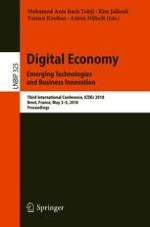2018 | OriginalPaper | Buchkapitel
An Adverse Drug Events Ontology Population from Text Using a Multi-class SVM Based Approach
verfasst von : Ons Jabnoun, Hadhemi Achour, Kaouther Nouira
Erschienen in: Digital Economy. Emerging Technologies and Business Innovation
Aktivieren Sie unsere intelligente Suche, um passende Fachinhalte oder Patente zu finden.
Wählen Sie Textabschnitte aus um mit Künstlicher Intelligenz passenden Patente zu finden. powered by
Markieren Sie Textabschnitte, um KI-gestützt weitere passende Inhalte zu finden. powered by
